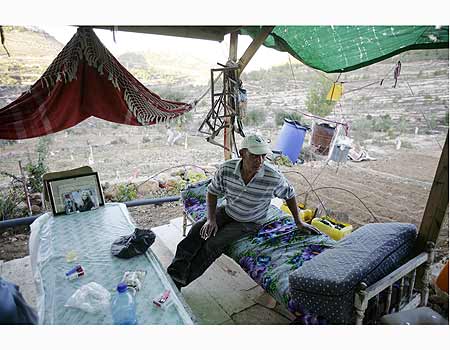Man camping in ancient cave near Jerusalem says has been told by Israeli authorities to get out because hillside is slated for housing development, his 'illegal' home will be demolished.
 The predicament of Abdel Fattah Abed Rabbo, a 48-year-old father of 10, highlights the dispute between Israel and Palestinians living in the steep hills between Jerusalem and Bethlehem, on land the Israelis annexed in 1980.
The predicament of Abdel Fattah Abed Rabbo, a 48-year-old father of 10, highlights the dispute between Israel and Palestinians living in the steep hills between Jerusalem and Bethlehem, on land the Israelis annexed in 1980.
Abed Rabbo says he was actually brought up in the cave by his parents but occupies it now simply as a way of upholding his claim to 5 acres of stony hillside. His family lives in an apartment in a Bethlehem refugee camp.
“Three days ago, Israeli building planners came. They started landscaping this entire area,” he told Reuters Television this week.
“The purpose is, of course, to build an Israeli settlement, called Givat Yael, which is to become the biggest settlement in the Jerusalem area,” he said.
Abed Rabbo says he received his first demolition warning five years ago, and got a follow-up notice last December. In the meantime, he says, Israeli authorities have three times knocked down the tent camp he put up on the land at al-Walajeh.
He is tangled in a complex legal maze that Palestinians say is really all about national rights but Israel insists is simply about property rights and unauthorized building.
The land straddles the 1948 Green Line which formed Israel’s eastern border at the establishment of the Jewish state. It lies just west of the Jewish settlement of Gilo, a suburb community of Jerusalem which is actually in the occupied West Bank.
The World Court has ruled that Israel’s settlements are illegal. Israel rejects that and officials say, in any case, the community planned for Givat Yael will not be a “settlement”, since the land has been part of Jerusalem for nearly 30 years.
Town planning
Givat Yael is planned to house 45,000 people, with a commercial zone and sports centre. The Interior Ministry’s district planning office recently granted final approval.
“They consider my presence here a problem, because they want to be build 14,000 housing units on al-Walajeh lands,” said Abed Rabbo. “I tell them the owners of this land are here, they are the rightful owners, and you’ve no right to build here.”
Some 500,000 Israelis now live in settlements in the West Bank and East Jerusalem, whose legitimacy is also disputed by the United Nations, the United States and most major powers.
City councilman for East Jerusalem Yakir Segev rejected claims that the hillside will become yet another settlement, taking land the Palestinians want for a future state.
“First of all, it’s not a settlement,” he said. “It’s a neighborhood within the municipal borders of Jerusalem.”
“Second of all … they were given court orders — not military orders … It’s not a matter of political dispute or political argument as far as we are concerned,” he said.
The Israeli-run Jerusalem municipality has rejected a request by al-Walajeh Palestinians to legalise 95 homes in the village built without a permit and at risk of demolition.
“The village will disappear, because most of the houses are under the master plan of Gival Yael,” says Meir Margalit, a left-wing opposition member of Jerusalem City Council.
Palestinians say Israeli planners have offered a number of concessions in return for consent, including retroactive permits for homes already built, a change in the route of Israel’s West Bank separation barrier in the vicinity of the village, and easier access to Jerusalem.
So far they have refused these offers.
If al-Walajeh is legally part of Jerusalem, its residents might expect to have Jerusalem identification cards. But they do not “because of the Givat Yael project”, says Margalit.
“It would be more difficult to expel them from their land if they had Israeli ID’s.”
And without a Jerusalem identity, Abed Rabbo is an illegal resident in his own cave.

No comments:
Post a Comment